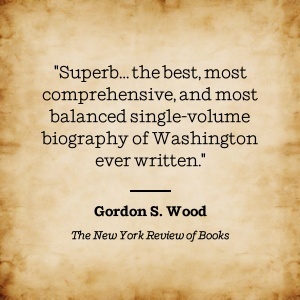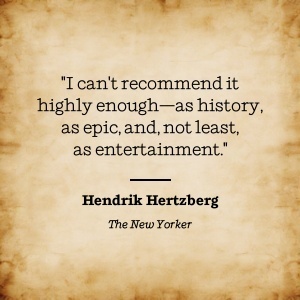Customer Services
Copyright © 2025 Desertcart Holdings Limited
Desert Online General Trading LLC
Dubai, United Arab Emirates



Full description not available



G**T
Chernow provides a fantastic and full examination of Washington's life
In his 2010 Washington: A Life, historian Ron Chernow became the latest author to write the authoritative single-volume biography of George Washington. It's certainly an impressive work, winning the Pulitzer Prize for Biography and weighing in at a hefty 948 pages or 42 hours on audio. Does this massive tome live up to all of this and bring something new to those who've read up on Washington? Yes, yes, it does.Much like Joseph J. Ellis' 2004 His Excellency: George Washington, the cornerstone of Chernow's approach is the recent (in historical perspective) Papers of George Washington Project at the University of Virginia. Using these papers, modern authors are able to dig into Washington's inner thoughts in a way that previous biographers like James Thomas Flexner, whose 1974 single volume biography Washington: The Indispensable Man was a previous champion of the single volume Washington bio genre, could not. But while Ellis settles for a mere 352 pages, Chernow goes to the limits of what a single volume can hold in nearly tripling that total. As a result, Chernow delves very deeply into Washington's life and thoughts, and covers both the man and his times as extensively as is likely possible between the confines of two covers.As one might expect between the now available original sources and the page count, Chernow covers Washington's life in great detail. Both by time frame - early life, French and Indian War, pre-Revolution, Revolution, private life between generalship and the presidency, presidency, and retirement - and subject - military, political, personal, economic, slavery - Chernow covers the man as well as many books focused on any single one of those subjects. I've read a lot on Washington and his times, and Chernow managed to illuminate each of those periods and subjects for me in some way even with my solid background.There are two main themes that Chernow uses to good effect. He focuses on Washington's relationships and his finances to get to his inner self.There are a large cast of secondary characters in this biography, and Chernow does an excellent job of getting the reader to know them on their own and in the context of their relationship with Washington. The major personages given this treatment are Martha Washington, Alexander Hamilton (not surprising, since Chernow previously wrote a massive 2004 biography of him, which is now high on my to-read list), the Marquis de Lafayette, Thomas Jefferson, Henry Knox, Nathanael Greene, John Adams, Sally Fairfax, and Washington's step-children and step-grandchildren. Chernow clearly demonstrates the impact Washington had on each of these people, and their impact on him.Chernow's focus on Washington's finances is another interesting approach. By following the old adage to follow the money, the reader gets a real sense of Washington's situation. His efforts to turn a profit on Mt. Vernon, the financial weight of slavery, his debt, the true costs of the land rich but cash poor Washington serving as Commander in Chief without pay, the costs of entertaining the multitudes who made the pilgrimage to Mt. Vernon, constant dental bills, and most importantly the devastating effects of his prolonged absences on his business interests, all combine to shine a light on a less glamorous but vital part of Washington's life. This last is especially vital, as in seeing how much Mt. Vernon suffered every time he was off serving his country, the reader gets a much better understanding of Washington's love of his country and his sense of public service.The period of Washington's life that Chernow expanded the most for me was his second term as president. A lot of attention is usually placed on the first term and the crucial precedents set then. While Chernow does indeed cover that well, the beginning of rough and tumble politics in his second term is fascinating, and seeing the increasingly fractious country begin to consider even Washington a fair game for political sniping is a major turning point in American politics.All of this effort - focusing on relationship and finances - does an amazing job of humanizing a man who often seems more monument than someone who actually lived. Chernow lets the reader really get to know Washington, both in his impressive patriotic context but also in the personal and sometimes flawed intimate details of so large a life as well. Chernow doesn't try to explain away the imperfections, either, instead letting them stand as equally valid parts of the man who often was indeed as great as he's been made out to be.I listened to Penguin Audio's 2010 production of the book, narrated by Scott Brick. The production was very well done, Brick delivers a powerful performance, giving the reading weight while still keeping a brisk pace, a necessity given the length of the book. The unabridged production runs approximately 42 hours.I highly recommend Chernow's Washington: A Life, even to those well-read on the man and his times. Chernow does a great job of providing new angles and insights, and it's the most complete picture of the Father of Our Country I've yet read. It's more of an investment in time than slimmer volumes, but it's well worth it. As mentioned previously, Chernow's biography of Hamilton is now high on my list and I plan to read that soon.
B**.
You come to know this man, Washington
It is quite a commitment by the reader to literally pick up and hold Ron Chernow's heavy (800+ pages) WASHINGTON and read it cover to cover. Chernow loves to write long books that are very readable, and yet surround you with many historical antidotes, character studies, and yet the length scares you from making the time commitment needed. I will admit I had to stop about midway to read another book before returning to Washington. Not that I was not enjoying Washington but the Washington personality can be a bit boring and repetitive at times. Maybe this is the type of book the Kindle was born for. I do agree that the book certainly deserves its Pulitzer Prize. It is written for the most part in a series of short chapters that almost stand alone as short stories. This enables one to read a chapter or two a day and still have a fulfilling reading experience.Chernow has done a masterful job of painting a complete picture of the Washington's personality and accomplishments. He is able to break into Washington's inner thoughts who's discovery is the result of research into the many newly located documents and letters. Chernow includes how concerned Washington was over money issues, that everyone thought rich and yet he had financial failure after failure and was land poor (and Washington would also say slavery poor, he owned over 300 with almost 100 under 12 years old and he discussed how unprofitable they were to maintain considering their low output. He freed his slaves after his death and the death of Martha. It was his hope others in the South would follow. No other founding father did however.)Washington was the right man and personality at the right time in America's history. He was the lease educated among a group of peers that were the educated elites of their time no doubt. Washington was a good listener and tired to build bridges, heard all sides of debate and was a strong advocate for the new constitution, a national army (vs state militias) and for a strong centralized national government. Despite being a Southerner most of his opposition came from his home state of Virginia. This because he was always a Federalist and sided with Hamilton on issue after issue, enough so that Jefferson and Madison became serious political rivals, mounting many attacks and forming the Republicans. Chernow shows how even in the late 1700's Washington had to deal with the South's fears and jealousy of the North and Washington's fear that it threatened the future of the union.The book is full of stories and adventures and accomplishments. But its real interest lies in relationships and how Washington managed them. He covers them all from his extended family (he had no children) to his marriage to his slaves to his political and military supporters and rivals.Washington was rather consistent and stoic when faced with life and death. So many died around him in combat and through disease that Washington seems to have lived a life of good fortune. (Although his death was quickened by a series of doctors that had only one cure, that was to bleed him to the point that he had lost half of his bodies volume of blood when he died.)Chernow spends a lot of time talking about artists who painted Washington and the results of these sessions. It would have been nice if these resulting portraits would have been shown on the page adjacent to the text discussing the picture.After you have finished the book you have a strong feeling that you have come to know this man, Washington. He is no longer some marble figure or infallible genius who became the father of his country. Which got me to thinking that when US History is taught in our schools the curriculum should spend more time on the conflicts, disagreements, and regional and economic issues fought over (peacefully up to the civil war) between the various "founding fathers" rather than foster that all was genius and agreement. For example Jefferson did not think much of the constitution and Washington saw it as a "living" document that could not possibly answer every question as the country grew and changed. Washington understood the nation's greatness would be determined on how things were implemented for good or bad. For the good Washington was there to set the way.
Trustpilot
1 month ago
3 weeks ago